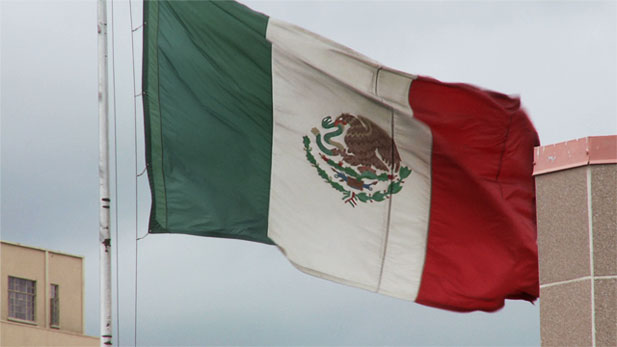
Story by Lorne Matalon, Fronteras Desk
Listen:
Mexican politicians and voters are preparing for the country’s midterm election Sunday.
Just as in the U.S., the balloting will be a referendum on the president’s performance.
Mexicans will elect all members of congress, 17 state legislatures and a host of governors and mayors. Results will have an impact on the U.S. side of the border.
Enrique Peña Nieto led his PRI party back to Los Pinos—Mexico’s White House—three years ago, pledging to change the national conversation.
Peña Nieto hyped economic and political reform. Mexicans loved the message.
He’d arrested the corrupt head of the politically powerful teachers union and he was crafting and telecommunications reform in an unprecedented attack against state and private monopolies. He said he’d confront corruption, but today, opposition election ads focus on one theme.
“Tolerancia cero para los políticos corruptos” or ‘Zero tolerance for corrupt politicians,’ a recent radio ad exclaims.
It castigates Peña Nieto, saying his anti-corruption rhetoric is hollow and cosmetic.
His presidency has been tarnished in the last year by violence and evidence of continuing corruption.
Last September - in the most shocking incident - 43 students were taken off buses in a small town in southern Mexico and murdered - allegedly on orders from an elected mayor.
More recently, in April, criminals murdered 15 police officers, shot down a military helicopter and set at least 15 banks on fire. A news report called it an unprecedented attack.
And In May the government was again on the defensive, after a shootout that left that 42 purported cartel members and one policeman dead. Some Mexicans say the dead were executed.
“Making change without spilling blood isn’t easy,” says Raul Acosta, a recently retired political science professor. He says Peña Nieto’s predecessor Felipe Calderón also wanted change that ended in violence.
Calderón thought he’d stabilize Mexico by confronting organized crime. It didn’t work. The violence seen today has its roots in Calderón’s war.
Now, Acosta says the biggest obstacle facing all parties isn’t disdain. It’s apathy.
“People have no motivation to vote,” he said.
Roberto Grado, a local leader of the opposition PAN party in Chihuahua, agrees.
“People are despondent,” Grado said. “They don’t have faith in any political party.” That’s also because there’ve been a series of allegations of corruption against every party.
The voices of political analysts are echoed by people on the streets of this northern Mexico state.
“I don’t trust them,” Alan Salvador Andrade, a clothing distributor in Ojinaga. “They’re all the same.”
His worst fear, he says, is that nothing will change, that corruption will continue to scar Mexico.
“I’m afraid of what’s going to happen,” Salvador said.
There’s a movement to annul or destroy votes by leaving ballots unchecked. Activists have blocked roads urging drivers to annul their votes to signal dissatisfaction.
Salvador doesn’t like that strategy.
“I don’t like when people say that, because our vote is the most important weapon that we have to change this situation,“ Salvador said.
Turnout in midterm elections in Mexico is notoriously low– and this time around may be even more so. National polls suggest flagging support for Peña Nieto.
Andrew Seeley is a researcher at the Woodrow Wilson Center in Washington, DC. He says there are fundamental questions the US hopes are answered on Sunday.
“Is Peña Nieto going to come out of this election strengthened?” Seeley asks, “Is he going to come out being seen as a leader who has a mandate, who has control of Congress, in which case he’s in a very strong position to look at some of the international issues including issues of economic opening with the United States.”
American energy companies are also watching. They’re eager to enter Mexico’s domestic energy sector.
Peña Nieto helped change Mexico’s constitution to allow foreign companies in. He overcame Mexican nationalists who say outsiders have no place in Mexico’s energy market. If he comes out of this midterm politically weakened, Peña Nieto will be forced to focus on building coalitions rather than on attracting foreign businesses.

By submitting your comments, you hereby give AZPM the right to post your comments and potentially use them in any other form of media operated by this institution.